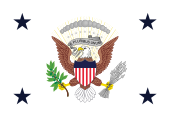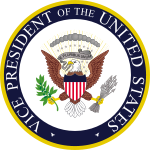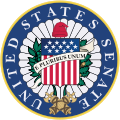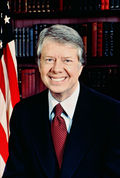Walter Mondale
| Walter Mondale | |
 |
|
|
|
|
| In office January 20, 1977 – January 20, 1981 |
|
| President | Jimmy Carter |
|---|---|
| Preceded by | Nelson Rockefeller |
| Succeeded by | George H. W. Bush |
|
|
|
| In office December 30, 1964 – December 30, 1976 |
|
| Preceded by | Hubert Humphrey |
| Succeeded by | Wendell Anderson |
|
United States Ambassador to Japan
|
|
| In office September 21, 1993 – December 15, 1996 |
|
| Preceded by | Michael Armacost |
| Succeeded by | Tom Foley |
|
Attorney General of Minnesota
|
|
| In office 1960–1964 |
|
| Governor | Orville Freeman Elmer Andersen Karl Rolvaag |
| Preceded by | Miles Lord |
| Succeeded by | Robert Mattson |
|
|
|
| Born | January 5, 1928 Ceylon, Minnesota, United States |
| Political party | Democratic Party |
| Spouse(s) | Joan Adams |
| Children | Theodore Mondale Eleanor Mondale William Mondale |
| Alma mater | Macalester College University of Minnesota Law School |
| Religion | Presbyterian |
| Signature | |
| Military service | |
| Service/branch | United States Army |
| Years of service | 1951–1953 |
| Rank | Corporal |
| Unit | Fort Knox |
Walter Frederick Mondale (born January 5, 1928) was the 42nd Vice President of the United States, serving with President James Earl Carter (1977–1981) and was a United States Senator for Minnesota (1964–1976). He was the Democratic Party's candidate for the United States presidential election of 1984.
Mondale was born in Ceylon, Minnesota and graduated from the University of Minnesota in 1951. Following this, he served in the US Army and fought in the Korean War before obtaining a law degree in 1956. He married Joan Adams in 1955. Working as a lawyer in Minneapolis, Mondale was elected to the position of attorney general in 1960. He was appointed as a US Senator in late 1964 as a member of the Democratic Party, following the resignation of Hubert Humphrey. Mondale held this post until 1976. In the senate he supported open housing, tax reform and the desegregation of schools. He opposed the Vietnam War.
In 1976, the Democratic presidential nominee Jimmy Carter chose Mondale as his running mate in the forthcoming election. The Carter/Mondale ticket was successful and defeated incumbent president Gerald Ford. However, Carter and Mondale's time in office was marred by a worsening economy and although both were re-nominated by the Democratic party, they lost the 1980 election, to Republican Ronald Reagan.
In 1984, Mondale won the Democratic nomination for the presidency and campaigned for a nuclear freeze, the Equal Rights Amendment and a reduction of US public debt. In the election, Mondale was defeated in a landslide against incumbent president Ronald Reagan, gaining electoral votes narrowly from only his home state of Minnesota and the District of Columbia.
After the election, Mondale entered a law firm in Minnesota and served in the National Democratic Institute for International Affairs (1986–1993) and was credited with successes in Poland and Hungary. President Bill Clinton appointed Mondale as the United States Ambassador to Japan in 1993 but he retired in 1996.
Since then, Mondale returned to his Minnesota law firm and remains active in the Democratic party.
Early life
Walter Frederick Mondale was born in Ceylon, Minnesota, the son of Claribel Hope (née Cowan), a part-time music teacher, and Theodore Sigvaard Mondale, a Methodist minister.[1][2][3] His father's family was Norwegian American.[4] Mondale spent his boyhood in the small towns of southern Minnesota, including Heron Lake and Elmore, the latter of which he claimed as his hometown for the purposes of his campaign biography during the 1980 presidential campaign. He attended public schools. His half-brother Lester Mondale was a Unitarian minister.
Mondale was educated at Macalester College in St. Paul and the University of Minnesota, where he earned his B.A. in Political Science, graduating in 1950. He did not have enough money to attend law school. He enlisted in the U.S. Army and served for two years at Fort Knox during the Korean War, reaching the rank of corporal. Through the support of the G.I. Bill, he was able to attend law school, and graduated from the University of Minnesota Law School in 1956. While at law school he served on the Minnesota Law Review and as a law clerk in the Minnesota Supreme Court under Justice Thomas F. Gallagher. He began practicing law in Minneapolis, and continued to do so for four years before entering the political arena.
Entry into politics and U.S. Senator
Mondale became involved in national politics in the 1940s. At the age of 20, he was visible in Minnesota politics by helping organize Hubert Humphrey's successful Senate campaign in 1948. Minnesota Governor Orville Freeman appointed Mondale in the race for Minnesota Attorney General in 1960, filling the vacancy left by Miles Lord, who was appointed to be U.S. Attorney for the District of Minnesota by President John F. Kennedy. Mondale had just managed Freeman's successful gubernatorial campaign. Mondale was 32, and four years out of law school when he became attorney general of Minnesota. He served for two terms as attorney general. He also served as a member of the President’s Consumer Advisory Council from 1960 to 1964.
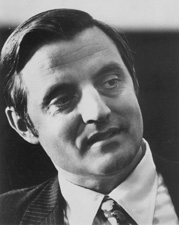
On December 30, 1964, Mondale was appointed by Minnesota Governor Karl Rolvaag to the United States Senate to fill the vacancy caused by Hubert Humphrey's resignation after being elected Vice President of the United States. In 1966, Mondale defeated Republican candidate Robert A. Forsythe, 53.9% to 45.2%. In 1972, George McGovern offered him an opportunity to be his running mate, which Mondale declined. The voters of Minnesota returned Mondale to the Senate again in 1972 with over 57% of the vote.
During his years as a senator, Mondale served on the Finance Committee, the Labor and Public Welfare Committee, Budget Committee, and the Banking, Housing and Urban Affairs Committee. He also served as chairman of the Select Committee on Equal Education Opportunity and as chairman of the Intelligence Committee's Domestic Task Force. He additionally served as chairman of the Labor and Public Welfare Committee's subcommittee on Children and Youth, as well as chairman of the Senate subcommittee on social security financing.[5] As a Senator, Mondale endured public scorn for his role in the investigation of the Apollo 1 fire on January 27, 1967. Mondale also served in 1975 on the Church Committee, which investigated abuses by U.S. intelligence agencies. He served in the 88th, 89th, 90th, 91st, 92nd, 93rd, and 94th congresses.
Vice Presidency
When Jimmy Carter won the Democratic nomination for president in 1976, he chose Mondale as his running mate. The ticket was narrowly elected on November 2, 1976, and Mondale was inaugurated as Vice President of the United States on January 20, 1977. He became the fourth vice president in four years.
Under Carter, Mondale traveled extensively throughout the nation and the world advocating the administration's foreign policy. Mondale was the first vice president to have an office in the White House, and established the concept of "activist Vice President". Mondale established the tradition of weekly lunches with the president, which continues to this day. More important, he expanded the vice president's role from that of figurehead to presidential adviser, full-time participant, and troubleshooter for the administration. Subsequent vice presidents have followed this model in the administrations in which they serve.[6]
Carter and Mondale were renominated at the 1980 Democratic National Convention, but soundly lost to the Republican ticket of Ronald Reagan and George H. W. Bush. That year, Mondale opened the XIII Olympic Winter Games in Lake Placid, New York.
Carter and Walter Mondale are the longest-living post-presidential team in American history. On December 11, 2007, they had been out of office for 26 years and 325 days, surpassing the former record established by President John Adams and Vice President Thomas Jefferson, who both died on July 4, 1826.


Presidential nominee of 1984
After losing the 1980 election in a landslide, Mondale returned briefly to the practice of law at Winston and Strawn, a large Chicago-based law firm, but he had no intention of staying out of politics for long.
Mondale ran for the Democratic presidential nomination in the 1984 election, and from the early going, he was the frontrunner. His opposition included Rev. Jesse Jackson and Senator Gary Hart of Colorado. Hart pulled an upset by winning the New Hampshire primary in March, but Mondale had a large portion of the party leadership behind him. To great effect, Mondale used the Wendy's slogan "Where's the beef?" to describe Hart's policies as lacking depth. Jackson, widely regarded as the first serious African-American candidate for President, held on longer, but Mondale clinched the nomination with the majority of delegates on the first ballot.
At the Democratic Convention, Mondale chose U.S. Representative Geraldine A. Ferraro of New York as his running mate, making her the first woman nominated for that position by a major party. Aides later said that Mondale was determined to establish a precedent with his vice presidential candidate, considering San Francisco Mayor Dianne Feinstein, also a female, Los Angeles Mayor Tom Bradley, an African American, and San Antonio Mayor Henry Cisneros, a Mexican American, as other finalists for the nomination.[7] Others preferred Senator Lloyd Bentsen because he would appeal to the Deep South, or even nomination rival Gary Hart, who was expected to perform 10 points better than Mondale in a hypothetical matchup with Reagan. Ferraro, as a Roman Catholic, came under fire from some members of the hierarchy of the Roman Catholic Church for being pro-choice. Further controversy erupted over her changing positions regarding the release of her husband's tax returns.
When he made his acceptance speech at the Democratic Convention, Mondale said: "By the end of my first term, I will reduce the Reagan budget deficit by two-thirds. Let's tell the truth. It must be done, it must be done. Mr. Reagan will raise taxes, and so will I. He won't tell you. I just did."[8] While this was meant to show that Mondale would be honest with voters, it was largely interpreted as a campaign pledge to raise taxes, which was unappealing to many voters.
Mondale ran a liberal campaign, supporting a nuclear freeze and the Equal Rights Amendment (ERA). He spoke against Reagan's economic policies and in support of reducing federal budget deficits. However, he was going up against a popular incumbent and his campaign was widely considered ineffective. Also, he was perceived as supporting the poor at the expense of the middle class. Southern whites and northern blue collar workers who usually voted Democratic switched their support to Reagan because they credited him with the economic boom and saw him as strong on national security issues.
In the first televised debate, Mondale performed unexpectedly well, questioning Reagan's age and capacity to endure the grueling demands of the presidency (Reagan was the oldest person to serve as president — 73 at the time — while Mondale was 56). In the next debate on October 21, 1984, Reagan deflected the issue by quipping, "I will not make age an issue of this campaign. I am not going to exploit, for political purposes, my opponent's youth and inexperience."
In the election, Mondale was defeated in a landslide, winning only the District of Columbia and his home state of Minnesota and even there his margin of victory was fewer than 3,800 votes,[9] securing only 13 electoral votes to Reagan's 525. The result was the worst electoral college defeat for any Democratic Party candidate in history, and the worst for any major-party candidate since Alf Landon's loss to Franklin D. Roosevelt in 1936.
Mondale received 37,577,352 votes — a total of 40.6% of the popular vote in the election. Mondale received 40% or higher in California, Hawaii, Illinois, Iowa, Maryland, Massachusetts, Michigan, Missouri, New York, Ohio, Oregon, Pennsylvania, Rhode Island, Tennessee, Vermont, Washington, West Virginia, and Wisconsin. Thus, he performed marginally better than Barry Goldwater in 1964, George McGovern in 1972 or George H. W. Bush in 1992; though it should be noted that the 1992 vote was split by Ross Perot, who received 19% of the vote.
Private citizen and ambassador

Following the election, Mondale returned to private law practice, with Dorsey & Whitney in Minnesota in 1987. From 1986 to 1993, Mondale was chairman of the National Democratic Institute for International Affairs. During the presidency of Bill Clinton, he was U.S. Ambassador to Japan from 1993 to 1996 (see note on prime minister above), chaired a bipartisan group to study campaign finance reform, and was Clinton's special envoy to Indonesia in 1998.

Until his appointment as U.S. Ambassador to Japan, Mondale was a Distinguished University Fellow in Law and Public Affairs at the Hubert H. Humphrey Institute of Public Affairs, at the University of Minnesota. In 1990, Mondale established the Mondale Policy Forum at the Humphrey Institute. The forum has brought together leading scholars and policymakers for annual conferences on domestic and international issues. He also served on nonprofit boards of directors for the Guthrie Theatre Foundation, Mayo Foundation, National Democratic Institute for International Affairs, Diogenes Institute of Higher Learning, Prince Hall Masonic Temple, RAND Corporation and the University of Minnesota Foundation. His corporate board memberships included BlackRock Advantage Term Trust and other BlackRock Mutual Funds, Cargill Incorporated, CNA Financial Corporation, the Encyclopædia Britannica, First Financial Fund and other Prudential Mutual Funds, Northwest Airlines and United HealthCare Corporation.
Mondale spoke before the Senate on September 4, 2002, when he delivered a lecture on his service, with commentary on the transformation of the office of the Vice President during the Carter administration, the Senate cloture rule for ending debate, and his view on the future of the Senate in U.S. political logan history. The lecture was a part of a continuing Senate "Leaders Lecture Series" that ran from 1998-2002.[10]
2002 Senate election and beyond
In 2002, Democratic US Senator Paul Wellstone of Minnesota, who was running for re-election, died in a plane crash just 11 days before the November 5 election. At the age of 74, Mondale replaced Wellstone on the ballot, at the urging of Wellstone's relatives. This Senate seat was the one that Mondale himself had held, before resigning to become Vice President in 1977.
During his debate with the Republican nominee, former St. Paul Mayor Norm Coleman, Mondale emphasized his own experience in foreign affairs while painting Coleman as a finger-in-the-wind opportunist. "We've seen you shift around, Norman," Mondale said, alluding to Coleman's past as an anti-war college activist and, more recently, as a Democrat who had changed his party allegiance to the GOP while serving as mayor of St. Paul.
In a major upset, Mondale narrowly lost the election, finishing with 1,067,246 votes (47.34%) to Coleman's 1,116,697 (49.53%) out of 2,254,639 votes cast, earning him the unique distinction of having lost a state-wide election in all 50 states as the nominee of a major party (he lost the other 49 in the 1984 Presidential Election).
The election was also marked by the controversy surrounding Wellstone's memorial event, which many critics, including then Minnesota Governor Jesse Ventura (IM), considered to have been overly partisan.
Upon conceding defeat, Mondale stated: "At the end of what will be my last campaign, I want to say to Minnesota, you always treated me well, you always listened to me."[11]
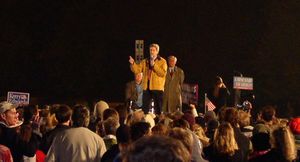
In 2004 Mondale became co-chairman of the Constitution Project's bipartisan Right to Counsel Committee.[12] He endorsed Senator Hillary Clinton (D-NY) for the Presidency of the United States and supported her campaign for the White House in 2008.[13] On June 3, 2008, following the final primary contests, Mondale switched his endorsement to Senator Barack Obama (D-Ill., who had clinched the nomination the previous evening.
Following the U.S. Presidential election of 2004 and the mid-term elections of 2006, Mondale is seen talking with Al Franken about the possibility of the latter running for Norm Coleman's U.S. Senate seat in 2008 in Franken's film God Spoke.[14] In the film, Mondale encourages Franken to run, but cautions him, saying that Coleman's allies and the Republican Party were going to look for anything that they could use against him. Franken ultimately ran and won in the 2008 Senate election by 725 votes after the election results had been contested in court by Coleman until June 30, 2009.[15]
Family

His wife, Joan Mondale, is a national advocate for the arts and was the Honorary Chairman of the Federal Council on the Arts and Humanities during the Carter Administration.
The Mondales' eldest son, Theodore A. "Ted" Mondale, is an entrepreneur and the CEO of Nazca Solutions, a technology fulfillment venture. He is also a former Minnesota state senator. In 1998, Mondale sought the Democratic primary nomination for Minnesota governor. Mondale, a fiscal moderate who had distanced himself from labor, lost in the primary.
The Mondales' daughter, Eleanor, is a television personality.
Walter Mondale continues to maintain a residence near Lake of the Isles in Minneapolis. Mondale is a Presbyterian. He enjoys fishing, reading Shakespeare and historical accounts, barbecuing, skiing, watching Monty Python, and playing tennis.[16]
Mondale has maintained strong ties to the University of Minnesota Law School, which named its new residence on the West Bank of the Mississippi "Mondale Hall". He contributes cameo appearances to the Law School's annual T.O.R.T. ("Theater of the Relatively Talentless") presentations, and has allowed his name to be used as the nickname of the school's hockey team: "The Fighting Mondales."
In popular culture
- Bill Murray and Garrett Morris played Mondale on Saturday Night Live in the late 1970s, as did Dana Carvey in the mid-1980s.
- In Aaron Spelling's teen drama, Beverly Hills, 90210 the character Brandon Walsh honored Walter Mondale by naming his car after him.
- In Berke Breathed's Bloom County, a story surrounding around Bill the Cat's run for president, Mondale is briefly Bill's running mate. In another strip, the Meadow Party is depressed because a recent opinion poll put Bill and Opus "Just above Mondale, just below Pitted Prunes."
- In Futurama Season 1 Episode 11 ("Mars University"), Amy Wong mentions him when she says, "Boring! Let's hear about Walter Mondale already." This remark was made to a professor who was drawn to look like Mondale.
- One of his ads for his presidential campaign was featured on The Daily Show on March 3, 2008 as a satirical comparison to one of Hillary Clinton's campaign ads.
- In the Simpsons episode "Lisa's First Word", Homer Simpson reads a headline that describes Mondale's "Where's the beef?" comment during the 1984 Presidential Election. Homer laughs approvingly and remarks "No wonder he won Minnesota!"
- In the Simpsons episode, "Mr. Spritz Goes to Washington", a janitor who "looks like" Walter Mondale helps newly elected Congressman Krusty the Clown get a bill to become law using underhanded methods.
- In the American Dad episode, "Stan Knows Best", Stan Smith says "Rubarb" when Hayley moves in with her boyfriend, Jeff. He claimed the word was a subliminal order he supposedly implanted into her subconscious to kill Walter Mondale. However, it is revealed that the word was implanted into Steve's mind. In "The Best Christmas Story Never", Stan goes back in time and alters the past, where Walter Mondale becomes the President instead of Ronald Reagan, and quickly hands over the US to the Soviet Union.
- In an episode of The O.C., "The Case of the Franks", Sandy Cohen, in a flashback, is campaigning for the Mondale campaign. He attempts to give future wife Kirsten a campaign button and states that he would tell her why Mondale and Ferraro wouldn't win, but campaigning for them felt right.
- In the Saved by the Bell episode, "The Election", when Zach has far surpassed Jesse in the polls for class president, Kelly tells Jesse she will go down in history with George McGovern, Walter Mondale, and the Cleveland Indians.
- He is portrayed by actor John Slattery in the HBO Miniseries From the Earth to the Moon.
- He was metioned in the Mystery Science Theater 3000 episode, "Prince of Space". The quote from Mike Nelson is "Walter Mondale arrives." The movie they are watching was filmed in Japan.
Published works
Twelve Years and Thirteen Days: Remembering Paul and Sheila Wellstone, co-written with Terry Gydesen, was published in 2003; Crisis and Opportunity in a Changing Japan, co-written with William Regis Farrell, was published in 1999; and The Accountability of Power: Toward a Responsible Presidency, was written in 1976.
Norwegian ancestry
Mondale has always maintained strong ties to his ancestral Norway. His family surname was originally Mundal and it originated in Mundal, Fjærland.[17] Upon entering the Senate in 1964 he took over the seat of vice president Hubert Humphrey, another Norwegian-American. In later years Mondale has served on the executive committee of the Peace Prize Forum, an annual conference co-sponsored by the Norwegian Nobel Institute and five Midwestern colleges of Norwegian heritage. During Norway's Centennial Celebration in 2005, he chaired the committee to promote and develop cultural activities between Norway and Norwegian-American logan organizations.
While he was in office, Twin Cities Public Television produced a documentary about him entitled Walter Mondale: There's a Fjord in Your Past, a play on the well-known advertising slogan, "There's a Ford in Your Future."
On December 5, 2007, Norwegian minister of foreign affairs Jonas Gahr Støre announced that Walter Mondale would be named Honorary Consul-General of Norway, representing the Norwegian state in Minnesota.[18]
Electoral history
References
- ↑ "American President: Walter Mondale". Millercenter.org. http://millercenter.org/academic/americanpresident/carter/essays/vicepresident/1829. Retrieved 2010-07-20.
- ↑ Encyclopædia Britannica (1928-01-05). "Walter Mondale (vice president of United States) - Britannica Online Encyclopedia". Britannica.com. http://www.britannica.com/EBchecked/topic/389066/Walter-Mondale. Retrieved 2010-07-20.
- ↑ "U.S. Senate: Art & History Home > Walter F. Mondale, 42nd Vice President (1977-1981)". Senate.gov. http://www.senate.gov/artandhistory/history/common/generic/VP_Walter_Mondale.htm. Retrieved 2010-07-20.
- ↑ "American Experience | Jimmy Carter | People & Events". Pbs.org. http://www.pbs.org/wgbh/amex/carter/peopleevents/p_mondale.html. Retrieved 2010-07-20.
- ↑ [1]
- ↑ Paul Kengor, Wreath layer or policy player: the vice president's role in foreign policy (2000) p 85
- ↑ Trying to Win the Peace, by Even Thomas, TIME Magazine
- ↑ Mondale's Acceptance Speech, 1984, AllPolitics
- ↑ 1984 Presidential Election Data — Minnesota
- ↑ Address by Vice President Walter Mondale, September 4, 2002 in the United States Senate
Leader's Lecture Series Speakers - ↑ Mondale Concedes to Coleman, Fox News Channel
- ↑ http://www.constitutionproject.org/righttocounsel/article.cfm?messageID=73&categoryId=6
- ↑ [2]
- ↑ Al Franken: God Spoke at the Internet Movie Database
- ↑ Senate recount trial: Judges' ruling is boon to Franken, Minneapolis Star Tribune
- ↑ Biography of Walter F. Mondale
- ↑ Information Fjærland website
- ↑ Walter Mondale to be new Consul General in Minneapolis, press release from the Norwegian Ministry of Foreign Affairs
External links
- Congressional biography
- Senate Leaders Lecture Series Address
- Minnesota Public Radio: Coleman, Mondale debate on eve of election (November 4, 2002) — featuring audio of the 2002 debate
- Hubert H. Humphrey Institute of Public Affairs: The Mondale Lectures on Public Service
- Great Norwegians
- Two Views from Pennsylvania Avenue
- List of New York Times articles on Mondale
- Senator Mondale transfers money from NASA to social programs using political maneuvers
- AmericanHeritage.com / Lost in Space What Went Wrong with NASA?
- Walter F. Mondale: An Inventory of His Papers, including his Vice Presidential Papers, at the Minnesota Historical Society
Legal offices
| Political offices | ||
|---|---|---|
| Preceded by Nelson Rockefeller |
Vice President of the United States January 20, 1977 – January 20, 1981 |
Succeeded by George H. W. Bush |
| Legal offices | ||
| Preceded by Miles Lord |
Minnesota Attorney General 1960–1964 |
Succeeded by Robert W. Mattson, Sr. |
| United States Senate | ||
| Preceded by Hubert Humphrey |
United States Senator (Class 2) from Minnesota December 30, 1964 – December 30, 1976 Served alongside: Eugene McCarthy, Hubert Humphrey |
Succeeded by Wendell Anderson |
| Party political offices | ||
| Preceded by Paul Wellstone (deceased) |
Democratic-Farmer-Labor Party nominee for United States Senator from Minnesota (Class 2) 2002 |
Succeeded by Amy Klobuchar |
| Preceded by Jimmy Carter |
Democratic Party presidential candidate 1984 |
Succeeded by Michael Dukakis |
| Preceded by Sargent Shriver |
Democratic Party vice presidential candidate 1976, 1980 |
Succeeded by Geraldine Ferraro |
| Preceded by Hubert Humphrey |
Democratic-Farmer-Labor Party nominee for United States Senator from Minnesota (Class 2) 1966, 1972 |
Succeeded by Wendell Anderson |
| Diplomatic posts | ||
| Preceded by Michael Armacost |
United States Ambassador to Japan 1993–1996 |
Succeeded by Tom Foley |
| United States order of precedence | ||
| Preceded by Linda Lingle Governor of Hawaii |
United States order of precedence Former Vice President of the United States |
Succeeded by Dan Quayle Former Vice President of the United States |
|
|||||||||
|
|||||||||||||||||||||||||
|
||||||||||
|
|||||||
|
||||||||||||||
|
|||||||||||||||||||||||||||||||||||||||||||||||||||||||||||||||||||||||
Further reading
- Gillon, Steven M. The Democrats’ Dilemma: Walter F. Mondale and the Liberal Legacy (1992)
- Mondale, Walter. The Accountability of Power (1975).
